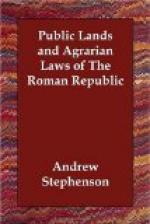save the few proprietors and creditors among them,
gained by every measure that had been proposed.
The poor man saw himself snatched from bondage and
endowed with an estate. He who was above the
reach of debt saw himself in the highest office of
the state. Plebeians with reason exulted.
Licinius evidently designed reuniting the divided
members of the plebeian body. Not one of them,
whether rich or poor, but seems called back by these
bills to stand with his own order from that time on.
If this supposition was true, then Licinius was the
greatest leader whom the plebeians ever had up to the
time of Caesar. But[8] from the first he was
disappointed. The plebeians who most wanted relief
cared so little for having the consulship opened to
the richer men of their estate that they would readily
have dropped the bill concerning it, lest a demand
should endanger their own desires. In the same
temper the more eminent men of the order, themselves
among the creditors of the poor and the tenants of
the domain, would have quashed the proceedings of
the tribunes respecting the discharge of debt and the
distribution of land, so that they carried the third
bill only, which would make them consuls without disturbing
their possessions. While the plebeians continued
severed from one another, the patricians drew together
in resistance to the bills. Licinius stood forth
demanding, at once, all that it had cost his predecessors
their utmost energy to demand, singly and at long intervals,
from the patricians. Nothing was to be done but
to unite in overwhelming him and his supporters.
“Great things were those that he claimed and
not to be secured without the greatest contention."[9]
The very comprehensiveness of his measures proved
the safeguard of Licinius. Had he preferred but
one of these demands, he would have been unhesitatingly
opposed by the great majority of the patricians.
On the other hand he would have had comparatively
doubtful support from the plebs. If the interests
of the poorer plebeians alone had been consulted,
they would not have been much more active or able
in backing their tribunes, while the richer men would
have gone over in a body to the other side with the
public tenants and the private creditors among the
patricians. Or, supposing the case reversed and
the bill relating to the consulship brought forward
alone, the debtors and the homeless citizens would
have given the bill too little help with hands or
hearts to secure its passage as a law. The great
encouragement therefore to Licinius and Sextius must
have been their conviction that they had devised their
reform on a sufficiently expanded scale. As soon
as the bills were brought forward every one of their
eight colleagues vetoed their reading. Nothing
could be done by the two tribunes except to be resolute
and watch for an opportunity for retaliation.
At the election of the military tribunes during that
year, Licinius and Sextius interposed[10] their vetoes
and prevented a vote being taken. No magistrates




